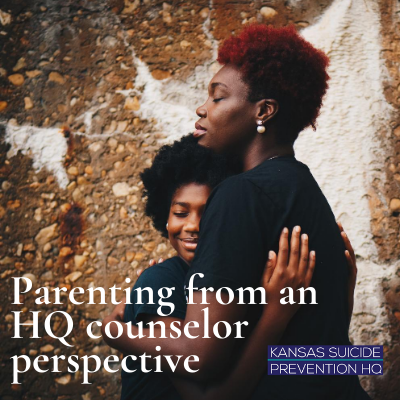By Kalli Sanders, HQ Counselor, Peer Support Counselor, and Administrative Coordinator (hey, we all wear a lot of hats around there)
I work at a suicide prevention crisis line. I’m also a mom. Like all parents, I’m horrified at the thought of somehow losing my child. We promote seatbelts and street safety. We talk about safety at home and in public. Our kids have lockdown drills at school to prepare for active shooters. Yet, it’s suicide that is the 2nd leading cause of death for kids ages 10-24.
Believe me, I don’t want to answer a suicide prevention line, I want to answer the “I had a shitty day and I need to talk to someone” line, or the “I have a problem and I’m hoping you can tell me who can help me with it” line.
When a call ends, I want to hear, “This actually made me feel a little better,” or even, “Well, I guess I’m going to wait and see what happens tomorrow.” Fortunately, much of the time, that is what I hear.
Those who don’t or can’t reach out for help are the people I wish I had a chance to listen to. I would ask, “Why don’t you tell me what’s going on?” My hope is always that it makes a difference, and my experience on the hotline tells me it does. Caller who struggle with suicidal thoughts tell me it does.
It’s that somebody who was taught, “it’s not okay to cry;” who was told, “you need to toughen up and get over it.” It’s the person who believes they’re never going to able to do enough for their kid, or who is afraid to leave an abusive partner, or who doesn’t feel quite right in their own skin. It’s the people who don’t have a sense of belonging, or feel connected or see a light at the end of the tunnel. It’s the one without hope. These are the real people captured in the web of statistics about suicide, but it doesn’t have to be this way for our kids. I don’t want it to be this way for my kid.
So, here are just a few of the ways I try my best to ensure that my daughter has the tools she needs to care for herself, to ask for help, to help others, and to keep an open dialogue about difficult issues. Maybe there is better parenting advice out there, but since I rarely get to give advice (we are trained not to do that on the phone lines), I’m going to take the opportunity to give some here.
Hit the pause button:
TV shows, movies, books, and videos bring up intense and relevant subjects in order to make for compelling, relatable viewing. Using these moments to ask questions, discuss deeper issues, and open doorways to more important conversations is a natural way to talk about things we might not know how to approach in every-day life with our kids.
My daughter and I were recently watching a popular TV show together in which one of the main characters was exhibiting signs of depression and stress to the point that he finally had a breakdown. He called someone for support, the support-person arrived, and together they began discussing ways to get professional help.
This scene provided a great opportunity for us to discuss how it could be relevant to her life. It opened up a discussion for us about depression, stress, and mental health that included how to reach out for help, how to offer help, and how that might look different for any of our friends or family. Being able to have these conversations openly and honestly has given my daughter a context of emotional safety and a framework for future conversations that might be difficult, but necessary, during a time of struggle.
Encourage having other trusted adults to share things with:
Of course, I would like to believe that my daughter will always come to me if something is bothering her, but I remember my own adolescence well enough to know that sometimes talking to your mom is the last thing you want to do. It might show a point of weakness or you might risk an “I told you so.” I am blessed to have many friends and family members that care about my daughter and me, and I know that they would step up and get my daughter the help she needs one way or another, even if that meant telling me some things I don’t want to hear.
The people closest to me know that I trust their judgment and that I want them to encourage and support my daughter however they see fit. It totally takes a village, and I’m not afraid to ask our village to step in if I’m not the best one to help at that moment. Likewise, my daughter knows who she can go to if she needs support when she doesn’t want me to be the person. I would rather have my daughter asking for help from adults that we both trust than relying solely on her peers when she’s in need.
Be honest:
I’m okay with my daughter knowing how some of my bad choices affected my life. She knows that going through tough times makes us who we are because I’ve shown her that by example. We talk about physical and mental health, drinking and drug use, dating, sex, conflicts with friends, coping skills, challenges, losses, failures, and accomplishments. We talk a lot about how to get through things.
Even more importantly, I ask her opinion about these things. I want her to know that I value and respect what she thinks and feels about stuff that she is experiencing now, or that she might experience someday. It’s important to me to validate her views, to point out the good ideas she has, and to honor the times that I see her assessing a particular scenario in a smart and capable way.
Empower them to have their own tools to get through things:
I know I cannot protect my daughter from every bit of harm or heartbreak, nor can I ensure her future happiness just by loving her as much as I do. So when she feels like life has let her down, or like things are too hard to try anymore, or like she’s never going to feel happy ever again, I want her to have some coping skills to get through that shit. I want her to know how to recognize and redirect negative thoughts and how to re-frame her logic. I want her to practice listening to the sounds of the trees in the wind, meditating or being mindful, counting her breaths, writing her hopes and dreams and fears and resentments down, and recognizing her emotions and her triggers. All of these are skills that might make a critical difference one day, and that has already been incredibly protective for her on many days.
These are things that I believe to be every bit as important to her education as a whole person as the stuff she’s learning in school. I’m searching for ways to help her feel the consequences of her actions or lack of action without destroying too much of her soul in the process. I’m taking her to therapy when she feels overwhelmed by anxiety so that she knows it’s okay to feel her feelings and so that she feels capable of coping with them.
I’m reading and YouTubing ways to be a better mom, for her sake as well as my own. I also let her see that I am human and that I have moments when I need a break, or when I feel overwhelmed and need to implement my own self-care practices. It’s okay to tell her how I’m feeling and the things I need to do to change whatever is making me unhappy, even if it’s hard to say, even if it feels scary.
It feels really good to help others in a way that feels right to them:
As helpers and caregivers, we are learning that people respond, cope, and survive in specific ways that may seem counterintuitive or illogical to an outsider, and this is okay. Hopefully, we are learning how to show support and compassion without conditions or judgment, and hopefully, we are moving towards accepting that it’s okay for people (and for ourselves) to not be okay. It’s courageous to say “I need help.” It takes guts to say “I need to set this boundary.” It’s radical to prioritize your emotional health and well-being even if that means you’re not always meeting the needs of others.
It feels good to make connections, pry open that shell of loneliness, or just sit next to someone in their pain who knows you are there. I believe strongly that when we are able to get outside of our own heads and honor the humanity of others – by showing support or encouragement, sharing a kind word, flashing a smile, or holding a door open – that we can make a difference for someone else. It’s also important to acknowledge when our presence is more harmful than helpful, whether it be harmful to ourselves or to the person we might think we are helping. Support looks different for everyone.
Remind them (and yourself) that it’s okay to not be okay:
Life can be sad. It can be hard, unfair, challenging, traumatic, exhausting, and boring. These things are all true for each of us at different times and for different reasons. But I hope that my daughter sees that there are options to cope with these hard feelings, whether it be taking a break as a simple stress reliever, or seeing a doctor and taking medication. I hope that when she feels like there’s no way she’s going to get through this life, that she not throw her hands up in defeat, but instead reaches her arms out and asks for help.
Many people end their lives because they want to end their pain. Fortunately, we are gaining more and more tools to help us live without being overwhelmed by pain. We may struggle, yet we are gaining an understanding of how our life experiences can be traumatic and can change our very souls. Pain changed those who came before us and will change those who come after us. Not until we learn how to see it, name it, and survive it will we break these cycles.
My daughter knows what I do at work. She knows that I talk openly with people who are sad or angry, who think about killing themselves, who are lonely and in need of a connection with another person. She says she’s proud of me for being a helper, and I see in her actions that she wants to be that for others as well. She tries hard to be a good friend. She tries to be understood and to understand others. Like me, she tries to be funny and cheerful, and sometimes she just can’t and is moody and needy. Part of MY learning process as a mom is remembering that “it’s okay not to be okay” applies to her as well. As long as she has tools to navigate it, talk about it, ask for help, or find what works for her, I believe she’ll be just fine.

